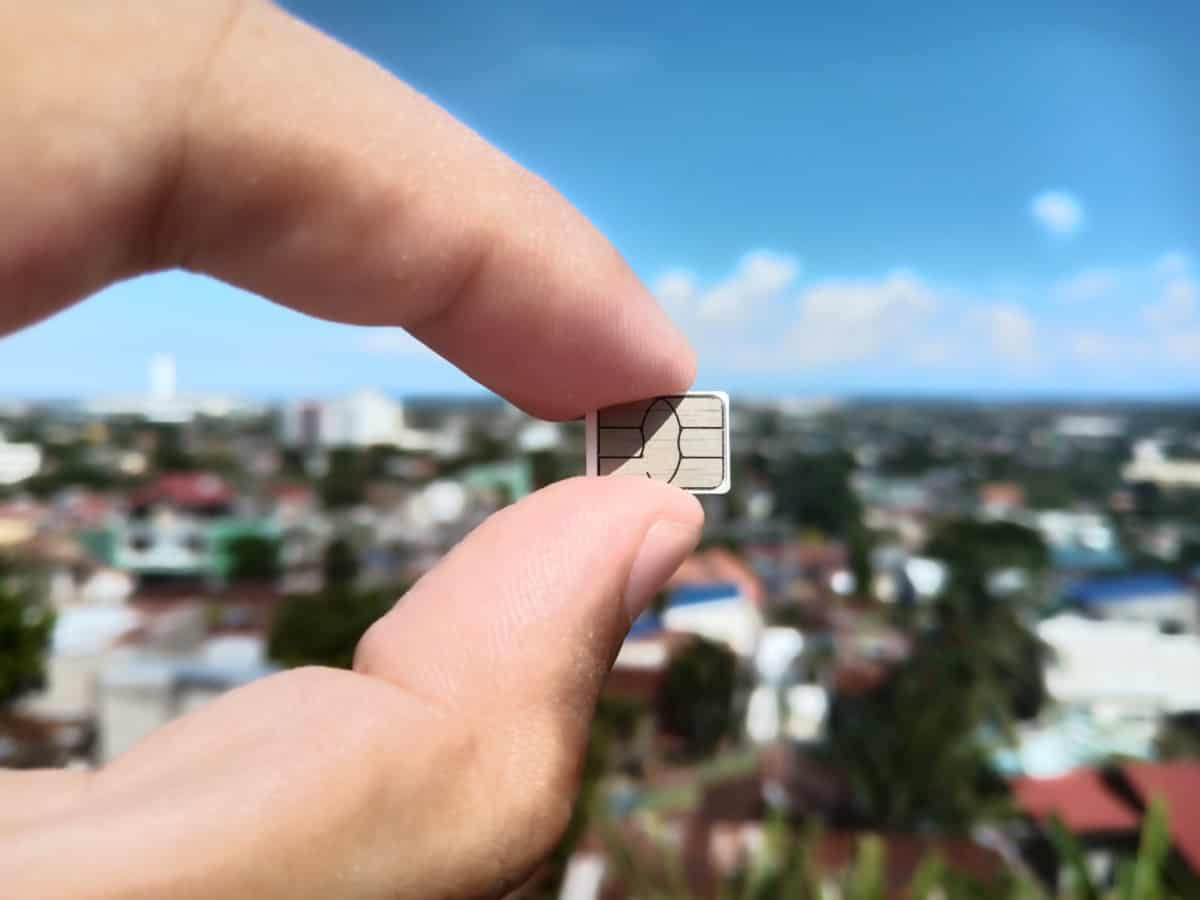Why Registering Your SIM Card is Important
Registering your SIM card is a crucial step in ensuring the security and functionality of your mobile device. It serves as a vital layer of protection against unauthorized usage and provides a means for authorities to track and recover lost or stolen devices. Additionally, SIM card registration is essential for enabling seamless communication services and ensuring compliance with local regulations.
By registering your SIM card, you establish a direct link between your mobile number and your identity. This connection is instrumental in safeguarding your personal information and preventing fraudulent activities, such as unauthorized SIM card swaps or illicit use of your mobile services. Moreover, in the event of a lost or stolen device, registered SIM cards can be quickly deactivated, mitigating the risk of misuse and unauthorized access to sensitive data.
Furthermore, SIM card registration is a fundamental requirement for accessing mobile network services. It enables mobile operators to verify the legitimacy of subscribers, thereby enhancing the overall security and reliability of their networks. This process also facilitates the seamless provision of essential services, such as emergency calls and location tracking, which are contingent upon accurate subscriber information.
In many jurisdictions, the registration of SIM cards is mandated by regulatory authorities to uphold national security measures and combat criminal activities. By ensuring that SIM cards are linked to verified user identities, governments and law enforcement agencies can effectively monitor and mitigate potential security threats, including illicit communications and unlawful activities conducted through mobile devices.
In essence, registering your SIM card is not only a matter of personal security and compliance but also a fundamental step in contributing to the overall integrity and safety of mobile communication networks. It empowers individuals to protect their privacy, facilitates the swift recovery of lost or stolen devices, and plays a pivotal role in upholding regulatory standards and national security protocols.
Ultimately, the importance of registering your SIM card cannot be overstated, as it serves as a cornerstone of mobile security, regulatory compliance, and seamless communication services.
Steps to Register Your SIM Card
-
Contact Your Mobile Operator: Initiate the registration process by reaching out to your mobile operator through their customer service channels. This can typically be done via phone, online chat, or by visiting a physical store. The customer service representative will guide you through the necessary steps and provide specific instructions based on their registration procedures.
-
Provide Personal Information: Prepare to furnish your personal details, including your full name, address, date of birth, and valid identification documents. These documents are crucial for verifying your identity and ensuring compliance with regulatory requirements. Be ready to present original copies of your identification, such as a government-issued ID card, passport, or driver's license.
-
Complete Registration Form: Your mobile operator may require you to fill out a registration form with the aforementioned personal information. This form serves as an official record of your SIM card registration and is used to link your identity to the specific mobile number associated with the SIM card.
-
Verification Process: Once you have submitted the necessary information and documentation, your mobile operator will undertake a verification process to authenticate the provided details. This may involve cross-referencing your information with official databases and conducting identity verification checks to ensure the accuracy and legitimacy of the submitted data.
-
Confirmation of Registration: Upon successful completion of the registration process, you will receive confirmation that your SIM card has been successfully registered. This confirmation may come in the form of a text message, email, or official documentation provided by your mobile operator.
-
Maintain Updated Information: It is important to keep your registered information up to date. In the event of any changes to your personal details, such as a change of address or contact number, promptly inform your mobile operator to ensure that your registration records remain accurate and current.
-
Compliance with Regulatory Requirements: Be mindful of any additional regulatory requirements or specific procedures mandated by local authorities or mobile operators. Adhering to these guidelines is essential to ensure full compliance with the registration process and to avoid any potential disruptions to your mobile services.
By following these essential steps, you can effectively register your SIM card and establish a secure and compliant connection between your mobile device and the mobile network, thereby contributing to a safer and more reliable mobile communication experience.
Documents Required for SIM Card Registration
When embarking on the process of registering your SIM card, it is imperative to ensure that you have the necessary documents readily available to facilitate a smooth and efficient registration experience. The specific documents required for SIM card registration may vary based on the regulations and guidelines established by your local telecommunications authority and mobile operator. However, certain standard documents are commonly requested to verify the identity of the individual registering the SIM card.
The primary document typically required for SIM card registration is a valid form of government-issued identification. This may include a national identity card, passport, driver's license, or any other officially recognized identification document bearing the individual's photograph and personal details. The purpose of presenting a government-issued ID is to establish the legal identity of the individual and ensure that the SIM card is linked to a verified and legitimate user.
In addition to the primary identification document, some mobile operators may request supplementary documents to further corroborate the registration details. Proof of address, such as a utility bill, rental agreement, or official correspondence from a government authority, is commonly sought to validate the residential address provided during the registration process. This serves to confirm the current place of residence of the individual and bolsters the accuracy of the registration information.
Furthermore, in certain jurisdictions or under specific circumstances, individuals may be required to furnish additional supporting documents to complete the SIM card registration process. These documents may include a valid residence permit for non-citizens, a taxpayer identification number (TIN), or any other official documentation mandated by local regulatory authorities or mobile operators to fulfill the registration requirements.
It is essential to ensure that all documents presented for SIM card registration are original, current, and valid. Photocopies or expired documents are typically not accepted as part of the registration process. Additionally, the information provided in the documents should align with the details furnished during the registration, thereby maintaining consistency and accuracy in the registration records.
By having the requisite documents readily available and ensuring their compliance with the registration criteria, individuals can expedite the SIM card registration process and establish a secure and verified connection between their identity and mobile services. Adhering to the document requirements stipulated by the mobile operator and regulatory authorities is instrumental in fostering a seamless and compliant SIM card registration experience.
Consequences of Not Registering Your SIM Card
Failing to register your SIM card can lead to a myriad of repercussions that encompass both personal and regulatory dimensions. The decision to forego the registration process can result in significant limitations and potential risks that may impact your mobile communication experience and overall security.
One of the primary consequences of not registering your SIM card is the restriction or suspension of essential mobile services. In many jurisdictions, mobile operators are mandated to enforce strict registration requirements, and failure to comply with these regulations can lead to the deactivation or suspension of the unregistered SIM card. This can result in the inability to make or receive calls, send text messages, or access mobile data services, thereby impeding your ability to communicate and stay connected through your mobile device.
Moreover, unregistered SIM cards may be susceptible to being blocked from network usage, rendering the device non-operational. This can significantly disrupt your access to emergency services, critical communications, and important network-based functionalities, posing potential risks in situations that necessitate immediate assistance or connectivity.
From a regulatory standpoint, the utilization of unregistered SIM cards may infringe upon national security protocols and regulatory frameworks established by telecommunications authorities. The unverified usage of SIM cards can undermine efforts to combat illicit activities, such as fraud, identity theft, and unauthorized communication channels, thereby posing inherent risks to the overall integrity of mobile networks and national security measures.
Furthermore, the lack of SIM card registration can exacerbate the vulnerability of mobile devices to misuse and unauthorized access. Without the protective measures afforded by registration, unregistered SIM cards are more susceptible to being exploited for fraudulent activities, unauthorized SIM swaps, or illicit use by third parties. This can potentially expose individuals to financial risks, privacy breaches, and the misuse of their mobile services for nefarious purposes.
In essence, the consequences of not registering your SIM card extend beyond mere compliance issues and encompass tangible impacts on the functionality, security, and regulatory adherence of mobile communication. By neglecting the registration process, individuals may face impediments in accessing essential mobile services, encounter regulatory non-compliance, and expose themselves to heightened security risks associated with unverified mobile usage.
Ensuring the registration of your SIM card is pivotal in upholding the integrity of mobile communication networks, safeguarding personal security, and complying with regulatory mandates. By recognizing the potential consequences of non-registration, individuals can proactively engage in the registration process to fortify the security and reliability of their mobile services.
Conclusion
In conclusion, the process of registering your SIM card is an indispensable aspect of ensuring the security, functionality, and compliance of your mobile communication experience. By establishing a direct link between your identity and mobile number, SIM card registration serves as a foundational pillar of personal security, regulatory adherence, and network reliability.
The importance of SIM card registration cannot be overstated, as it not only safeguards individuals against unauthorized usage and potential security threats but also contributes to the overall integrity of mobile communication networks. Through the registration process, individuals fortify their ability to swiftly deactivate lost or stolen devices, mitigate the risks of unauthorized access, and uphold regulatory standards mandated by telecommunications authorities.
Furthermore, the seamless provision of essential services, such as emergency calls and location tracking, hinges upon the accurate registration of SIM cards, underscoring the pivotal role of registration in facilitating critical functionalities that underpin mobile communication.
By following the essential steps for SIM card registration and ensuring compliance with document requirements, individuals can establish a secure and verified connection between their identity and mobile services. This not only fosters a safer and more reliable mobile communication experience but also aligns with national security measures and regulatory frameworks aimed at combating illicit activities and safeguarding the integrity of mobile networks.
In essence, the decision to register your SIM card is not merely a procedural formality but a proactive step towards enhancing the security, compliance, and reliability of your mobile communication. By recognizing the potential consequences of non-registration and embracing the significance of the registration process, individuals can actively contribute to the overall resilience and integrity of mobile communication networks while safeguarding their personal security and regulatory adherence.
Ultimately, SIM card registration stands as a testament to the pivotal role of individual responsibility in upholding the security and reliability of mobile communication, underscoring the collective efforts to fortify the foundations of a safe and compliant mobile ecosystem.

























